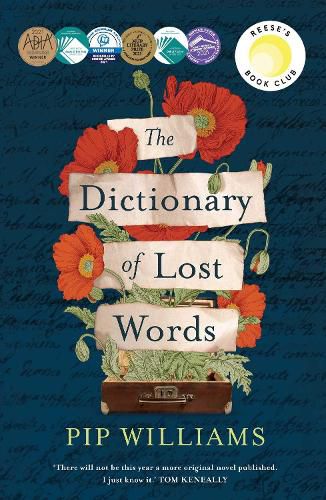Readings Newsletter
Become a Readings Member to make your shopping experience even easier.
Sign in or sign up for free!
You’re not far away from qualifying for FREE standard shipping within Australia
You’ve qualified for FREE standard shipping within Australia
The cart is loading…






In 1901, the word ‘Bondmaid’ was discovered missing from the Oxford English Dictionary. This is the story of the girl who stole it.
Esme is born into a world of words. Motherless and irrepressibly curious, she spends her childhood in the ‘Scriptorium’, a garden shed in Oxford where her father and a team of dedicated lexicographers are collecting words for the very first Oxford English Dictionary. Esme’s place is beneath the sorting table, unseen and unheard. One day a slip of paper containing the word ‘bondmaid’ flutters to the floor. Esme rescues the slip and stashes it in an old wooden case that belongs to her friend, Lizzie, a young servant in the big house. Esme begins to collect other words from the Scriptorium that are misplaced, discarded or have been neglected by the dictionary men. They help her make sense of the world.
Over time, Esme realises that some words are considered more important than others, and that words and meanings relating to women’s experiences often go unrecorded. While she dedicates her life to the Oxford English Dictionary, secretly, she begins to collect words for another dictionary: The Dictionary of Lost Words.
$9.00 standard shipping within Australia
FREE standard shipping within Australia for orders over $100.00
Express & International shipping calculated at checkout
In 1901, the word ‘Bondmaid’ was discovered missing from the Oxford English Dictionary. This is the story of the girl who stole it.
Esme is born into a world of words. Motherless and irrepressibly curious, she spends her childhood in the ‘Scriptorium’, a garden shed in Oxford where her father and a team of dedicated lexicographers are collecting words for the very first Oxford English Dictionary. Esme’s place is beneath the sorting table, unseen and unheard. One day a slip of paper containing the word ‘bondmaid’ flutters to the floor. Esme rescues the slip and stashes it in an old wooden case that belongs to her friend, Lizzie, a young servant in the big house. Esme begins to collect other words from the Scriptorium that are misplaced, discarded or have been neglected by the dictionary men. They help her make sense of the world.
Over time, Esme realises that some words are considered more important than others, and that words and meanings relating to women’s experiences often go unrecorded. While she dedicates her life to the Oxford English Dictionary, secretly, she begins to collect words for another dictionary: The Dictionary of Lost Words.
To write this review, obviously, I had to have completed reading the book and that is the sadness for me because I did not want it to end. This absorbing story that incorporates lexicography, dictionaries and books with the story of a young girl growing up in Edwardian England engrossed me.
You might think the study of lexicography a dry topic for a novel but Pip Williams manages to bring alive the beginnings of the first Oxford Dictionary through the eyes of Esme, whose father is one of the compilers working on James Murray’s epic first edition of the OED. It is as if The Surgeon of Crowthorne crossed paths with Esme and this is its progeny.
Towards the end of the nineteenth century Esme is a little motherless girl who goes to work with her Da at the Scriptorium, a converted garden shed at James Murray’s property. She also spends time at the Murray house with their young maid, Lizzie, a relationship that endures into adulthood and becomes a friendship that transcends cultural and class divides.
One day one of the postcard-sized papers that are used to record the words falls near her, either discarded or accidently, but Esme decides to keep it and entrusts Lizzie to store it in an old case in her room. So begins her collection of words. She finds that quite often they are words that women use, particularly poorer women, and she becomes fascinated by women at the market who utter slang or female vernacular, and she collects these words as well. She is an astute and intelligent observer.
Esme comes of age when women are agitating for the vote, to be heard in their own right and have more control over their lives and yet the job she does (she is working on the dictionary now) is mainly looking at words, hence she is looking at the world through a male perspective. As she gains more freedom with age, her world broadens to encompass literary Oxford. There she meets people who will impact on her life in so many ways.
Esme and her world really resonated with me. She is a terrific character: intelligent, empathetic and resilient. I was exhilarated reading this novel and I really wanted her ‘Dictionary of Lost Words’ to exist so I could own it – owning the iconic complete Oxford Dictionaries no longer seemed enough!
See what the Readings’ team have to say on the blog, discover related events and podcast episodes.
We reached out to members of the Australian literary community, asking them to nominate their favourite Australian books, published since 2000. The result is this list of the 30 best Australian books of the 21st century!
Travel to Ancient Greece to Renaissance Italy to the trenches of war, with these incredible historical reads.